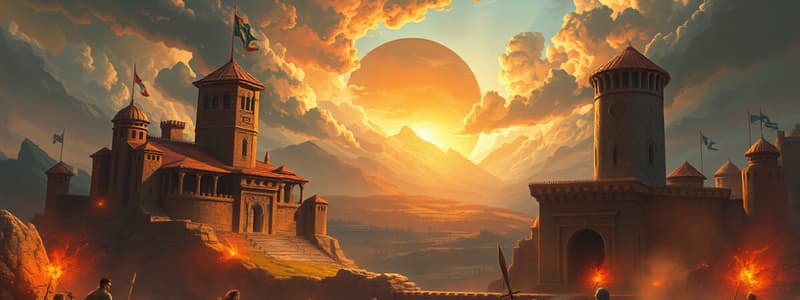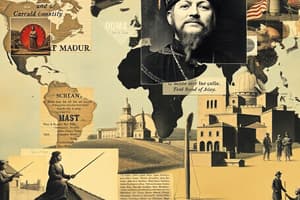Podcast
Questions and Answers
Which ancient civilization is known for the invention of writing?
Which ancient civilization is known for the invention of writing?
- Mesopotamia (correct)
- Greece
- Rome
- Egypt
What was the main social structure in Medieval Europe?
What was the main social structure in Medieval Europe?
- Monarchy
- Merchant Class
- Feudalism (correct)
- Democracy
Which climate zone is characterized by extremely cold conditions?
Which climate zone is characterized by extremely cold conditions?
- Desert
- Temperate
- Tropical
- Polar (correct)
What major global issue involves rising temperatures and extreme weather?
What major global issue involves rising temperatures and extreme weather?
Which theory explains the mechanism of evolution proposed by Charles Darwin?
Which theory explains the mechanism of evolution proposed by Charles Darwin?
Which artistic movement is characterized by an emphasis on light and color, often depicting everyday scenes?
Which artistic movement is characterized by an emphasis on light and color, often depicting everyday scenes?
What significant global health crisis emerged in 2019, affecting health systems worldwide?
What significant global health crisis emerged in 2019, affecting health systems worldwide?
Which renewable energy source has seen considerable growth in recent years?
Which renewable energy source has seen considerable growth in recent years?
Who is an influential author known for works such as 'Pride and Prejudice'?
Who is an influential author known for works such as 'Pride and Prejudice'?
Which genre of music originated in African American communities in the early 20th century and features improvisation?
Which genre of music originated in African American communities in the early 20th century and features improvisation?
Flashcards are hidden until you start studying
Study Notes
History
-
Ancient Civilizations:
- Mesopotamia: Considered the "cradle of civilization," known for the invention of writing (cuneiform).
- Egypt: Famous for pyramids, pharaohs, and hieroglyphics. The Nile River was vital for agriculture.
- Greece: Birthplace of democracy, philosophy, and the Olympic Games. Key figures include Socrates, Plato, and Aristotle.
- Rome: Known for its republic, legal system, and vast empire. Important contributions to engineering and architecture.
-
Middle Ages:
- Feudalism: Social structure in Medieval Europe; lords, vassals, and serfs.
- The Crusades: Religious wars between Christians and Muslims for control of the Holy Land.
- The Black Death: Plague that killed approximately one-third of Europe’s population in the 14th century.
-
Modern History:
- World Wars: WWI (1914-1918) and WWII (1939-1945) significantly reshaped global politics.
- The Cold War: Tension between the USA and USSR post-WWII, leading to a nuclear arms race and proxy wars.
- Civil Rights Movements: Struggles for equality, including the American civil rights movement of the 1960s.
Geography
-
Continents and Oceans:
- Seven continents: Africa, Antarctica, Asia, Europe, North America, Australia, South America.
- Five oceans: Pacific, Atlantic, Indian, Southern, Arctic.
-
Major Landforms:
- Mountains: Himalayas (highest), Andes, Rocky Mountains.
- Rivers: Nile, Amazon, Yangtze, Mississippi.
- Deserts: Sahara, Arabian, Gobi.
-
Climate Zones:
- Tropical: Hot and humid; rainforests found here.
- Temperate: Distinct seasons; suitable for agriculture.
- Polar: Extremely cold; tundra and ice caps.
Science
-
Branches of Science:
- Physics: Study of matter, energy, and the fundamental forces of nature.
- Chemistry: Study of substances, their properties, and reactions.
- Biology: Study of living organisms, including their structure, function, growth, and evolution.
-
Scientific Method:
- Systematic observation, measurement, and experiment.
- Formulation, testing, and modification of hypotheses.
-
Key Theories:
- Theory of Evolution: Natural selection as a mechanism for evolution by Charles Darwin.
- Relativity: Einstein's theories explaining gravity and the behavior of objects in space and time.
Current Events
-
Global Issues:
- Climate Change: Rising temperatures, extreme weather, and international climate agreements (e.g., Paris Agreement).
- Political Conflicts: Ongoing tensions in regions like the Middle East, Ukraine, and the South China Sea.
- Health Crises: COVID-19 pandemic's impact on global health, economy, and travel.
-
Technological Advancements:
- Artificial Intelligence: Rapid developments in machine learning and its applications in various industries.
- Renewable Energy: Growth in solar, wind, and other sustainable energy sources.
Arts and Culture
-
Visual Arts:
- Movements: Impressionism, Surrealism, Cubism, and Modernism.
- Notable Artists: Leonardo da Vinci, Vincent van Gogh, Pablo Picasso.
-
Literature:
- Genres: Fiction, non-fiction, poetry, drama.
- Influential Authors: William Shakespeare, Jane Austen, Mark Twain, Gabriel García Márquez.
-
Music:
- Genres: Classical, jazz, rock, hip-hop.
- Key Figures: Ludwig van Beethoven, Louis Armstrong, The Beatles, Beyoncé.
-
Performing Arts:
- Theatre: Originating from ancient Greece, modern forms include musicals and dramas.
- Dance: Various styles like ballet, modern dance, and cultural dances.
History
-
Ancient Civilizations:
- Mesopotamia, recognized as the "cradle of civilization," pioneered cuneiform writing.
- Egypt is renowned for monumental pyramids, influential pharaohs, and the use of hieroglyphics; the Nile River was crucial for agricultural practices.
- Greece is celebrated as the birthplace of democracy, philosophy, and the Olympic Games, with key philosophers including Socrates, Plato, and Aristotle shaping Western thought.
- Rome contributed significantly to law, governance, and architecture, establishing a vast empire that influenced subsequent civilizations.
-
Middle Ages:
- The feudal system structured Medieval Europe into a hierarchy of lords, vassals, and serfs.
- The Crusades were a series of religious wars aimed at reclaiming the Holy Land from Muslim control.
- The Black Death, a devastating plague in the 14th century, led to the death of about one-third of Europe's population.
-
Modern History:
- The two World Wars drastically altered global politics and social structures, occurring in the first half of the 20th century.
- The Cold War characterized the rivalry between the USA and USSR, including a nuclear arms race and numerous proxy wars.
- Civil Rights Movements, notably in the 1960s, sought equality and justice, significantly impacting social reforms.
Geography
-
Continents and Oceans:
- There are seven continents: Africa, Antarctica, Asia, Europe, North America, Australia, and South America.
- The Earth's five major oceans include the Pacific, Atlantic, Indian, Southern, and Arctic Oceans.
-
Major Landforms:
- The Himalayas stand as the tallest mountain range, followed by the Andes and Rocky Mountains.
- Significant rivers include the Nile, Amazon, Yangtze, and Mississippi.
- Major deserts consist of the Sahara, Arabian, and Gobi.
-
Climate Zones:
- Tropical zones are marked by hot, humid conditions, where rainforests thrive.
- Temperate zones experience distinct seasons, promoting agricultural practices.
- Polar regions are known for extreme cold, characterized by tundra and ice caps.
Science
-
Branches of Science:
- Physics explores matter, energy, and the fundamental forces within the universe.
- Chemistry delves into substances and their properties, including reactions and interactions.
- Biology focuses on living organisms, examining structure, function, growth, and evolution.
-
Scientific Method:
- Involves systematic observation and experimentation, leading to the formulation and testing of hypotheses.
-
Key Theories:
- The Theory of Evolution, formulated by Charles Darwin, explains natural selection as a driver of evolution.
- Einstein's Relativity provides insights into gravity and the behavior of objects in both space and time.
Current Events
-
Global Issues:
- Climate change is marked by rising global temperatures and increased extreme weather events, prompting international efforts like the Paris Agreement.
- Political conflicts are prevalent in areas such as the Middle East, Ukraine, and the South China Sea.
- The COVID-19 pandemic has profoundly affected global health systems, economies, and travel norms.
-
Technological Advancements:
- Artificial Intelligence is experiencing rapid growth in machine learning, with significant applications across diverse sectors.
- Renewable energy sources, including solar and wind, are expanding to promote sustainability.
Arts and Culture
-
Visual Arts:
- Artistic movements include Impressionism, Surrealism, Cubism, and Modernism, influencing the evolution of creative expression.
- Notable artists like Leonardo da Vinci, Vincent van Gogh, and Pablo Picasso have left a lasting legacy on visual culture.
-
Literature:
- Distinctions among genres feature fiction, non-fiction, poetry, and drama, with notable authors such as William Shakespeare, Jane Austen, Mark Twain, and Gabriel García Márquez shaping literary discourse.
-
Music:
- Diverse genres encompass classical, jazz, rock, and hip-hop, with key figures like Ludwig van Beethoven, Louis Armstrong, The Beatles, and Beyoncé revolutionizing their respective styles.
-
Performing Arts:
- Theatre has roots in ancient Greece, evolving into modern forms like musicals and dramatic performances.
- Dance includes a range of styles, including ballet, modern dance, and various cultural dances, reflecting human expression and creativity.
Studying That Suits You
Use AI to generate personalized quizzes and flashcards to suit your learning preferences.




